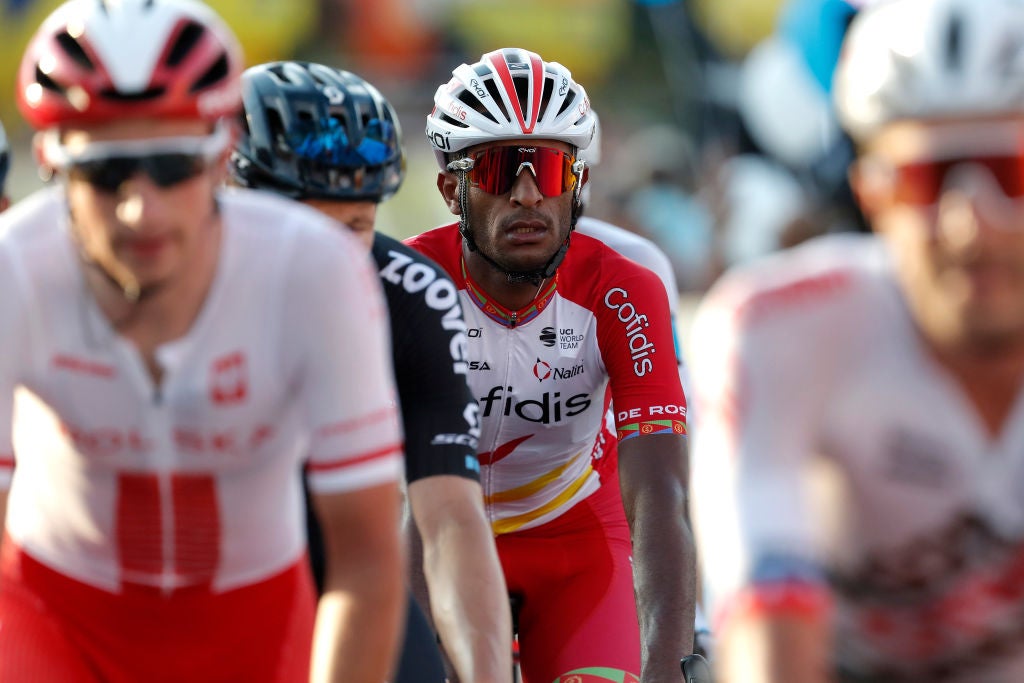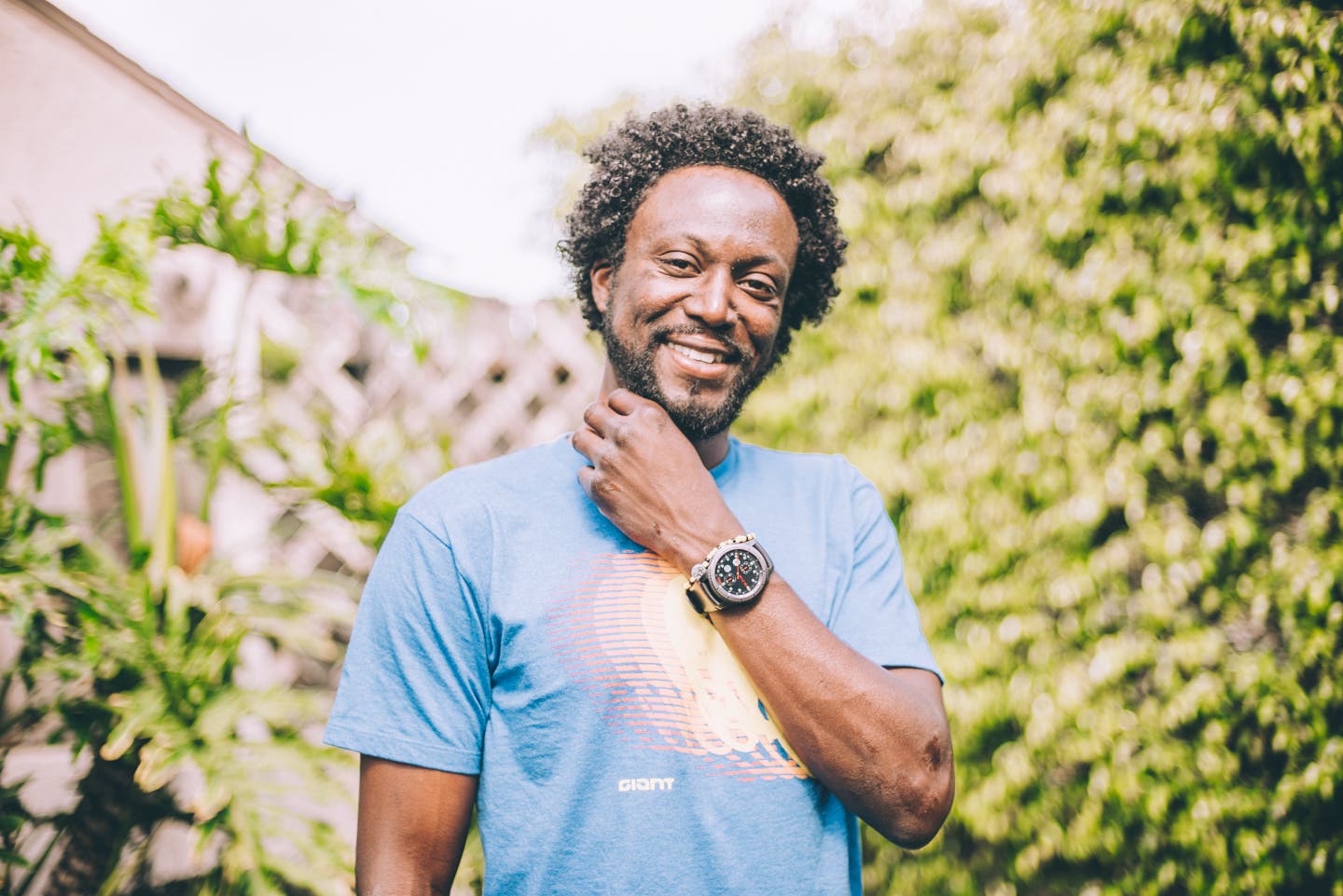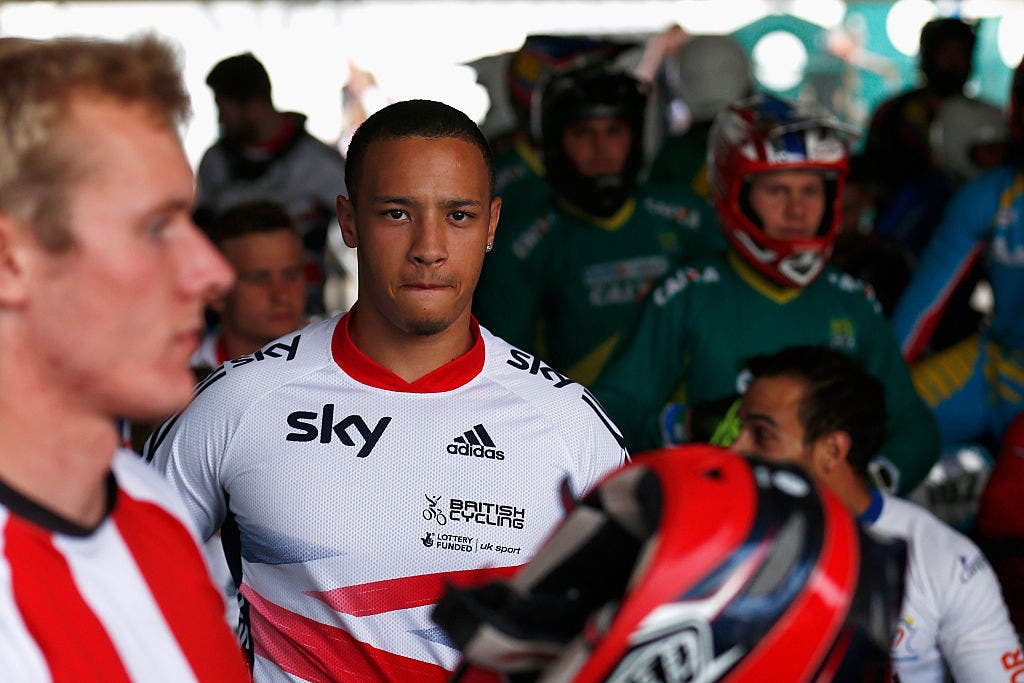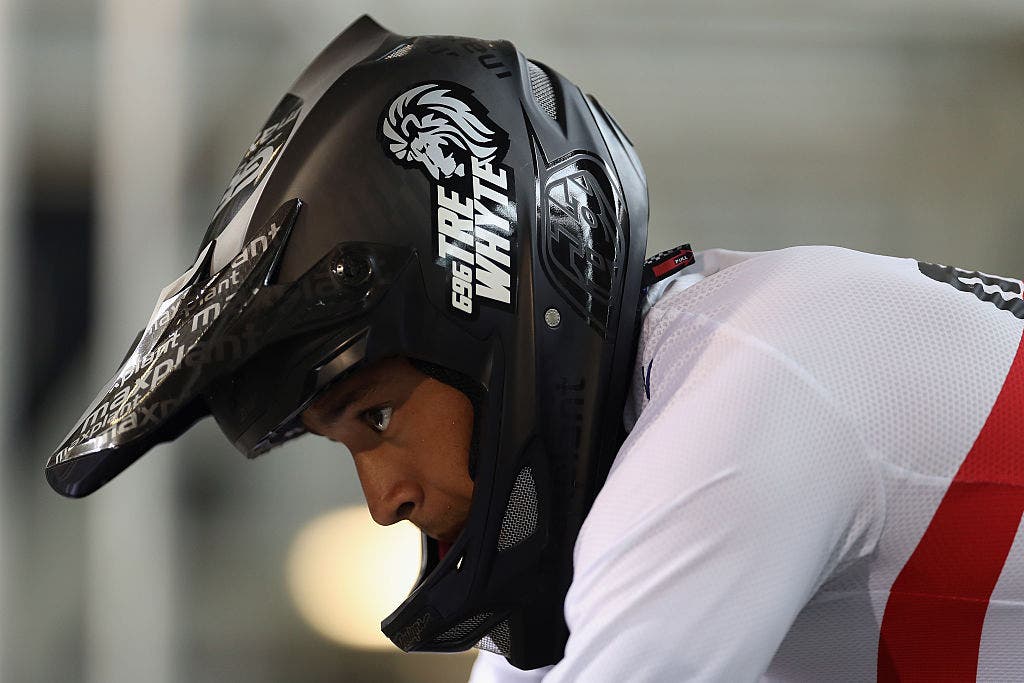Book excerpt: Desire Discrimination Determination — Black Champions in Cycling

BUKOVINA RESORT, POLAND - AUGUST 12: Natnael Berhane of Eritrea and Team Cofidis at finish line during the 78th Tour de Pologne 2021, Stage 4 a 160km stage from Azoty Group, Tarnów to Bukovina Resort 924m / @Tour_de_Pologne / #TDP2021 / #UCIWT / on August 12, 2021 in Bukovina Resort, Poland. (Photo by Bas Czerwinski/Getty Images)
Editor’s note: The following is an excerpt from the new book “Desire, Discrimination, Determination — Black Champions in Cycling” by Dr. Marlon Moncrieffe and published by Rapha Editions, Bluetrain Publishing. The book was released to the public on August 17, 2021. The book provides a collation of international and historical stories of Black cyclists — the hurdles they have faced and accolades they have achieved.
“Was I?” I thought. I looked at him. I politely pretended to listen to what he was saying as he went on. I carried on dismantling my bike as he continued. He eventually walked off back to his car to finish changing out of his racing kit. I grew up on a predominantly white council estate in South-West London. I had lived long enough amongst white people to detect those who felt uncomfortable with the black presence.
Maurice Burton (x3 British cycling champion) had the same sixth sense in his early experiences of riding with his first club.
“I became a member of the VCL (Velo Club de Londres). Well, I guess there are a lot of people of color in the VCL now. But at the time that I went in there, it was only me. I used to ride with some of those guys, and some were OK. I remember going out riding with a few of them one day, and I rode behind them for like 60 miles, and they never spoke to me. I think it may have been because of the color of my skin. I just rode with them, and that was it.”
Maurice’s reflections chime with [x10 USA champion] Rahsaan Bahati’s more direct response concerning his experience of anti-blackness on some of his first club rides.

“I have been on training rides where I have had older adults who did not like me because, one, the color of my skin, and two, I was better than them. This is as a kid, having a white guy in his 40s tell me to get off a ride.”
To have to wake up every day with the immediate thought that you may face hostilities, hate and even physical violence in cycling from white people simply because of having a skin color that does not match theirs was the reality of Major Taylor during his racing career of the late 19th century and early 20th century as presented in Chapter 1. To what extent has this direct racism towards black people in competitive cycling continued?
Maurice Burton shared further with me an account of how his friend Joe Clovis, another black rider, was dragged away from the sight of spectators by white cycling rivals after a race at Crystal Palace and assaulted.
“There was a bit of an argument off the bike. Two of the guys held Joe whilst another laid into him. I was not there. But if I were, it would have been a different matter. They really would have seen me.”
That was in the 1970s. But what about today?
When Maurice along with a large group of his predominantly black British De Ver cycling team club mates, travelled to watch his son Germain Burton race at the 2012 World Junior Road Race Championships – he was shocked by the racist behavior of UCI officials.
“When I was 11 years old, I took part in Trophée de France des Jeunes Cyclistes – it is a competition that brings together all the regions of France represented by two youth riders in each category. I took part with my best friend Joris Inapogui, who is of Ivorian origin. We were the only black cyclists. When we were surrounded by the other children, they called us monkeys and told us to eat our bananas. These behaviors were produced in front of their parents, who said nothing. We went to see our parents and they told us that it was on the bike that we were going to show them what we are capable of. At the time I didn’t realize it was racism. I was not even aware of being different. It was at the age of 11, following these insults, that I understood racism.”
At the 2014 Tour of Spain, Douglas Ryder – team principal for the African MTN-Qhubeka – recounted how, when his riders were trying to bring one of their black team-mates to the front of the bunch in the mountains “one of the biggest teams in the world… shouted: ‘You guys don’t belong here, f**k off to the back of the bunch.’”
Nicholas Dlamini, a black South African cyclist, has spoken of racist mistreatment towards black riders in the professional peloton.
“It is true that there has been a lot of incidents of racism in the peloton. I’ve seen it happening to the African guys. I’ve seen it happen to [Cofidis rider] Natnael Berhane. We were racing up a climb and it was crunch time. Natnael was about 20 meters ahead of me, and there was this one rider moving up. He came alongside Natnael and just pushed him straight off the road. I looked at that and I thought: ‘You can’t do that.’ But Natnael didn’t mind it. I think it’s happened so many times to him that he doesn’t even take it into account anymore.
“But I saw what it was like. It wasn’t cool. I think the guy just looked at him and thought: ‘You’re a black guy. You’re not supposed to be here anyway. I need to go past, so I’m just going to push you.’ Those small things.”
Christian Lyte [the former British Cycling Olympic Development Program track sprinter] sees his experiences with British Cycling as one imposed upon him as the interloper.

“I was with the talent team for two years and then it progressed to the Olympic Development Program. [At that time] there were not any other cyclists like me; you know, of a similar ethnic identity. You do question it a bit. I think that there were some social and interactional barriers for me when I was at British Cycling. I think people already saw me as an outsider. You know, different to the normal [white] cyclist on the talent team. I did not have that face to fit if that makes sense. Most of the guys that were on the squad at the time were, you know, there were a few Yorkshire lads who were kind of like ‘lad lads’; you know like typical sort of English lads. I just did not sort of get along with that, at the time.”
These reflections from Christian chime with early career professional African American experiences. For example, Justin Williams (x11 USA cycling champion).
“The hardest part was probably the isolation. Feeling like you are not understood. People not really knowing how to deal with you. What is important to you, what troubles you.
Rahsaan Bahati had similar thoughts.
“[Being in] a predominantly white fraternity when with Team TIAA-CREF in 2016 meant I didn’t fit in. That’s what it felt like. The net effect of these constant reminders that you are an outsider is to make you think: ‘Maybe I’m never going to belong, and I shouldn’t be doing this.’ That is the impact. Any black person who exists in a white space like cycling has to check a part of themselves at the door.”
Tim Erwin’s [US ex-pro] reflections of being othered chime with this:
“Being black [in a dominant white space] can feel like you are screaming into the void. We’ve said that these things happen, and then they happen again, and again, and again, but nothing changes. It [racism] is so ingrained in the culture. Like, the suspicion that comes with having a nice bike. I can remember taking my own bike into a shop in Louisiana, and getting asked: ‘Did you steal this bike?’ The average white person gets talked down to in shops a lot of times; the average black person gets talked down to and is assumed to be a criminal.”

Former professional BMX rider Tre Whyte reflects as well on his feelings of white surveillance and black stereotype imposed upon him in his early days with the British Cycling talent team at the National Cycling Centre.
“My older brother Daniel was on the program before me, and he was treated differently by people. He eventually had to leave. So, when I first moved up to Manchester to join the talent team, I felt like my [black] identity and my background [coming from a council estate in Peckham, London] could create some barriers for me. Little things. Like, people would say that I ‘drove a stolen car’ and ‘had it out there in the garage’. It was not stolen at all. I had people in positions of power calling me on the phone and telling me to ‘get rid of that stolen car’, or you are gonna be ‘kicked off ’ [the talent team]. I sensed I was not liked very much. You know, I was like 18 going on to 19 years old at the time.”
What do all these black cyclist’s perceptions and experiences of racism evidence? Racial hostilities in competitive cycling directed at black people in the past in are alive very much in the present. These oral testimonies show that all levels of the sport, there are white racing cyclists and white people who are incapable of figuring out a way to cope with the appearance of ethnic diversity (black people in particular). And so, by their ignorance they choose abuse this. The black cyclist is made to feel as though he or she has committed an offense by entering the white-dominated world of bike racing.